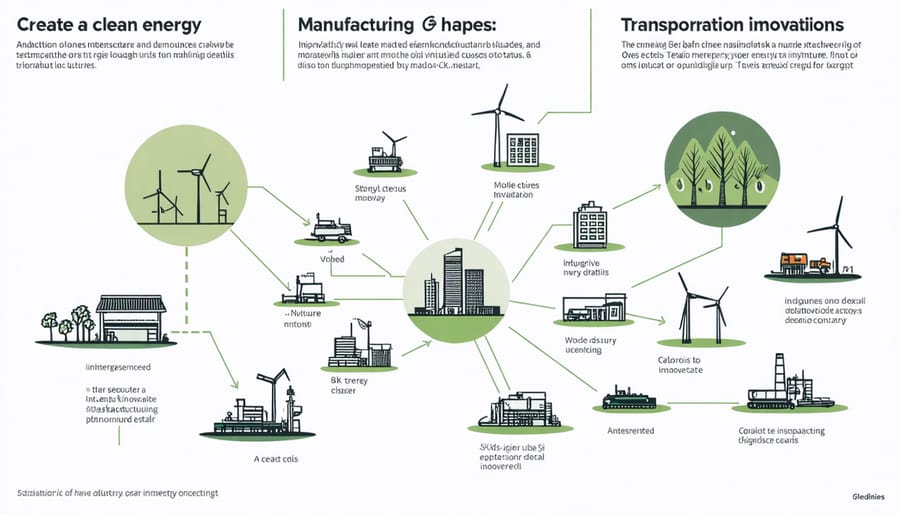Eco-innovation stands at the forefront of Canada’s economic future, driving sustainable growth while creating unprecedented market opportunities. From cleantech startups revolutionizing waste management to renewable energy pioneers transforming our power grid, Canadian entrepreneurs are leading the global charge in sustainable business solutions. In 2023 alone, eco-innovative companies attracted over $4 billion in investment capital, demonstrating the sector’s robust growth potential and investor confidence.
This surge in eco-innovation isn’t just about environmental stewardship – it’s reshaping traditional business models and opening new revenue streams. Companies leveraging sustainable technologies are experiencing 2.5 times faster growth rates than their conventional counterparts, while reducing operational costs by an average of 30%. For Canadian businesses, this represents a crucial opportunity to gain competitive advantage in both domestic and international markets.
The convergence of environmental consciousness, technological advancement, and supportive government policies has created the perfect storm for eco-innovation to thrive. Whether you’re an established business looking to pivot towards sustainability or an entrepreneur seeking to launch a green startup, understanding the eco-innovation landscape is no longer optional – it’s imperative for long-term success in today’s rapidly evolving market.
The Rise of Eco-Innovation in Canadian Startups
Market Drivers and Growth Potential
The eco-innovation market is experiencing robust growth, driven by increasing environmental awareness, stringent regulations, and shifting consumer preferences. Recent market analysis indicates that Canadian businesses adopting eco-innovative practices are seeing a 15-25% increase in operational efficiency and market share.
Key factors propelling this growth include rising carbon pricing initiatives, government incentives for sustainable technologies, and growing investor interest in ESG-focused ventures. According to the Business Development Bank of Canada, 85% of consumers now actively seek environmentally responsible products and services, creating substantial market opportunities for eco-innovative solutions.
Corporate sustainability commitments are also accelerating market expansion, with major Canadian corporations pledging to achieve net-zero emissions by 2050. This has created a ripple effect throughout supply chains, spurring demand for innovative green technologies and sustainable business practices.
The potential for growth is particularly strong in sectors such as clean energy, sustainable transportation, waste management, and green building technologies. Industry experts project the Canadian eco-innovation market to grow at a compound annual growth rate of 12% through 2025, presenting significant opportunities for entrepreneurs and investors alike.
Success Stories in Canadian Green Tech
Canadian companies are leading the green tech revolution with innovative solutions that address global environmental challenges. Carbon Engineering, based in British Columbia, has pioneered direct air capture technology that removes CO2 from the atmosphere, securing major investments from industry giants like Microsoft and Chevron.
Montreal-based GHGSat demonstrates Canadian ingenuity through its satellite technology that monitors greenhouse gas emissions from industrial facilities worldwide. The company’s success has attracted $30 million in Series B funding and established partnerships with the European Space Agency.
Semios, a precision agriculture company from Vancouver, showcases how IoT technology can reduce pesticide use while improving crop yields. Their smart farming solutions now monitor over 150,000 acres across North America, reducing water consumption by 20% and chemical applications by 50%.
These success stories highlight Canada’s growing influence in sustainable innovation, with cleantech exports reaching $7.8 billion annually. Local entrepreneurs continue to leverage government support, research partnerships, and private investment to scale their solutions globally.


Key Areas of Eco-Innovation Impact
Clean Energy Solutions
Clean energy innovation in Canada continues to reshape the sustainability landscape, with breakthrough technologies driving significant progress in renewable energy and energy efficiency. Canadian companies like Hydrostor, pioneering advanced compressed air energy storage, exemplify the transformative potential of clean energy solutions.
Solar and wind power technologies have seen remarkable advancements, with improved efficiency and reduced costs making these options increasingly attractive to businesses. According to the Canadian Renewable Energy Association, the integration of smart grid technologies and energy storage solutions has enhanced the reliability of renewable energy systems by 40% over the past five years.
Energy efficiency innovations are equally impactful, with Canadian startups developing smart building management systems and industrial process optimization tools. Toronto-based Peak Power’s AI-driven energy management platform has helped commercial buildings reduce energy consumption by up to 30%, demonstrating the tangible benefits of these solutions.
Investment in clean energy technology reached $9.2 billion in 2022, reflecting growing confidence in the sector. Programs like Natural Resources Canada’s Clean Growth Program provide crucial support for emerging technologies, helping businesses scale their clean energy innovations while creating sustainable employment opportunities across the country.
Sustainable Manufacturing
Sustainable manufacturing has emerged as a cornerstone of eco-innovation, with Canadian companies leading the way in developing groundbreaking circular economy initiatives that minimize waste and maximize resource efficiency. Industry leaders like Vancouver-based Loop Resources have pioneered closed-loop production systems that transform manufacturing byproducts into valuable raw materials for other processes.
The adoption of smart factory technologies and AI-driven optimization has enabled manufacturers to reduce energy consumption by up to 30% while maintaining productivity. Companies such as Ontario’s EnviroMetrics have developed sophisticated waste tracking systems that help businesses identify and eliminate inefficiencies in their production processes.
Advanced materials recovery and recycling innovations are reshaping traditional manufacturing approaches. For instance, Calgary-based Pure Fiber Processing has developed a revolutionary textile recycling technology that transforms post-industrial fabric waste into high-quality fiber for new garments.
These innovations are supported by government incentives and industry partnerships that encourage the implementation of sustainable practices. The Industrial Research Assistance Program (IRAP) provides crucial funding for companies developing waste reduction technologies, while industry clusters facilitate knowledge sharing and collaborative innovation in sustainable manufacturing.
Green Transportation
Electric vehicles (EVs) are leading the charge in Canada’s green transportation revolution, with companies like Lion Electric in Quebec demonstrating how local innovation can transform the automotive sector. Their electric buses and trucks are already operating in major cities across North America, significantly reducing urban emissions while creating sustainable employment opportunities.
Beyond personal vehicles, innovative mobility solutions are reshaping how Canadians move. Shared mobility platforms and smart transportation systems are gaining traction, with Toronto-based companies pioneering AI-powered traffic management solutions that optimize route efficiency and reduce fuel consumption.
“The future of transportation is not just about replacing gas engines with batteries,” explains Dr. Sarah Chen, Transportation Innovation researcher at the University of British Columbia. “It’s about reimagining mobility entirely.” This approach has led to breakthrough developments in hydrogen fuel cell technology, where Vancouver-based Ballard Power Systems continues to be a global leader.
Canadian municipalities are embracing these innovations through expanded charging infrastructure, dedicated lanes for electric vehicles, and integrated transportation apps that connect various eco-friendly mobility options. The federal government’s Zero-Emission Vehicle Infrastructure Program further supports this transition by funding charging station installations nationwide.
Support Systems for Eco-Innovation
Government Initiatives and Funding
The Canadian government offers substantial support for eco-innovation through various programs and funding initiatives. Innovation Canada leads with its flagship program, providing up to $5 million in funding for sustainable technology projects. The Scientific Research and Experimental Development (SR&ED) tax incentive program offers significant tax credits for companies developing green technologies and sustainable solutions.
Business Development Bank of Canada (BDC) maintains a dedicated cleantech practice, offering specialized financing options and advisory services for eco-innovative companies. Their Cleantech Practice has committed over $600 million to support Canadian cleantech firms scaling their operations.
Provincial governments complement federal initiatives with region-specific programs. For instance, Ontario’s Cleantech Innovation Initiative provides matching funds up to $500,000 for qualifying projects, while British Columbia’s Innovative Clean Energy (ICE) Fund supports clean energy technology development.
Notable funding sources include Sustainable Development Technology Canada (SDTC), which has invested over $1.38 billion in cleantech projects since its inception. The program specifically targets early-stage companies with breakthrough sustainable technologies.
Recent policy changes have enhanced access to these resources, with streamlined application processes and increased funding pools. The Clean Growth Hub serves as a single window for businesses to navigate available government support, connecting entrepreneurs with relevant programs and expert advice.
These initiatives demonstrate Canada’s commitment to positioning itself as a global leader in eco-innovation, supporting businesses through various stages of development and commercialization.
Private Sector Partnerships
Private sector partnerships play a pivotal role in accelerating eco-innovation across Canada. Established businesses are increasingly recognizing the value of collaborating with eco-focused startups, creating mutually beneficial relationships that drive sustainable development forward. These partnerships provide startups with access to valuable resources, market expertise, and distribution networks while offering larger corporations fresh perspectives and innovative solutions.
Companies like TD Bank and RBC have established dedicated innovation labs and accelerator programs, actively seeking partnerships with cleantech startups. These initiatives create sustainable investment opportunities while fostering technological advancement in areas such as renewable energy, waste reduction, and sustainable manufacturing.
Notable success stories include Vancouver-based Carbon Engineering’s partnership with Occidental Petroleum, which accelerated the development of direct air capture technology. Similarly, Montreal’s GHGSat collaboration with Shell has enhanced global methane emissions monitoring capabilities.
To establish successful partnerships, eco-innovators should:
– Clearly demonstrate their value proposition
– Ensure alignment with potential partners’ sustainability goals
– Develop scalable solutions that complement existing business operations
– Maintain flexibility in partnership structures
– Protect intellectual property while fostering open innovation
Industry leaders suggest that startups seeking corporate partnerships should focus on solving specific environmental challenges while demonstrating clear commercial viability.
Future Outlook and Opportunities
Emerging Technologies
The landscape of eco-innovation is being transformed by groundbreaking technological advancements. Smart sensors and Internet of Things (IoT) devices are revolutionizing resource management, enabling businesses to monitor and optimize their environmental impact in real-time. Canadian company Semtech Corporation has pioneered LoRaWAN technology, which powers smart city initiatives across the country with minimal energy consumption.
Artificial Intelligence and machine learning are driving unprecedented efficiencies in renewable energy systems. Vancouver-based MineSense Technologies exemplifies this trend, using AI-powered sensors to reduce mining waste and energy usage by up to 20%. Blockchain technology is also making waves, with Toronto startups implementing transparent supply chain tracking for sustainable products.
Biotechnology is emerging as a powerful force in eco-innovation, with Canadian firms developing biodegradable alternatives to traditional plastics. Montreal’s Carbicrete has created a revolutionary concrete-making process that captures CO2 instead of releasing it, demonstrating how emerging technologies can transform traditional industries.
Advanced materials science is yielding new sustainable solutions, from self-healing materials that extend product lifespans to super-efficient solar cells. The National Research Council of Canada reports that quantum computing applications are showing promise in optimizing green chemistry processes and accelerating the discovery of sustainable materials.
These technologies are not just theoretical – they’re being implemented across Canadian industries, creating new opportunities for entrepreneurs while addressing urgent environmental challenges.

Market Expansion Potential
The market potential for eco-innovation continues to expand rapidly, driven by increasing environmental awareness and stringent regulations worldwide. Canadian businesses are uniquely positioned to capitalize on this growth, with projections showing the global green technology market reaching $12.4 trillion by 2030. Domestic opportunities are particularly strong in renewable energy, sustainable agriculture, and clean transportation sectors.
Canadian green technology leaders are already successfully penetrating international markets, particularly in the United States, European Union, and emerging Asian economies. The Canada-EU Trade Agreement (CETA) and CUSMA provide preferential access to these lucrative markets, creating significant advantages for Canadian eco-innovators.
Key growth areas include smart city solutions, waste management technologies, and energy-efficient building systems. The Indigenous Clean Energy Network reports that First Nations communities are increasingly partnering with eco-innovation companies, creating new market opportunities while supporting sustainable development goals.
Export Development Canada (EDC) estimates that Canadian clean technology exports could triple by 2025, suggesting substantial room for expansion. Companies focusing on scalable, adaptable solutions are finding particular success in cross-border markets. The integration of digital technologies with sustainable solutions is creating additional opportunities, especially in data-driven environmental monitoring and management systems.
Eco-innovation represents a transformative force in Canada’s business landscape, offering unprecedented opportunities for entrepreneurs to create positive environmental impact while building successful ventures. Throughout this exploration, we’ve seen how innovative solutions in clean technology, sustainable manufacturing, and circular economy practices are reshaping industries and creating new market opportunities.
Canadian entrepreneurs are uniquely positioned to lead in this space, supported by robust government initiatives, growing investor interest, and an ecosystem that increasingly values sustainable business practices. The success stories we’ve examined demonstrate that eco-innovation isn’t just about environmental stewardship – it’s about creating viable, profitable businesses that address pressing global challenges.
For entrepreneurs considering entering this space, the time to act is now. Start by identifying areas where your expertise can contribute to sustainable solutions. Leverage available resources, including government grants, accelerator programs, and industry networks. Connect with successful eco-innovators and learn from their experiences.
Remember that eco-innovation is an ongoing journey of improvement and adaptation. Stay informed about emerging technologies, changing regulations, and evolving market needs. Consider joining industry associations and participating in sustainability-focused business networks to remain at the forefront of green innovation.
By embracing eco-innovation, you’re not just building a business – you’re contributing to Canada’s sustainable future and positioning yourself in a rapidly growing market that promises both financial returns and meaningful environmental impact.
